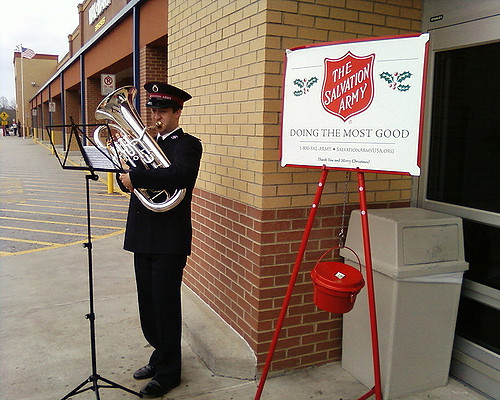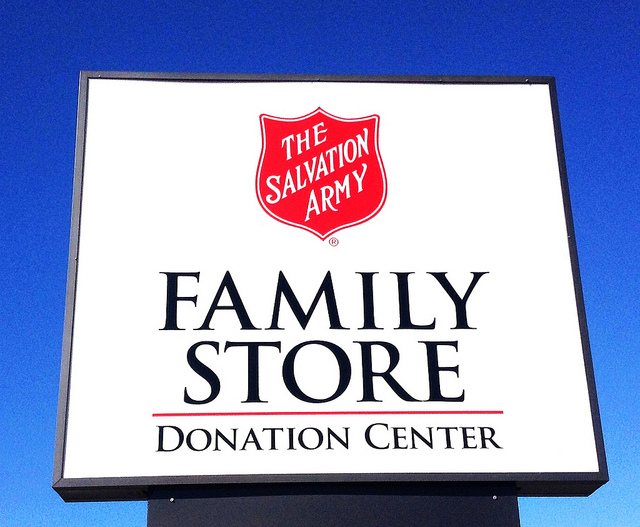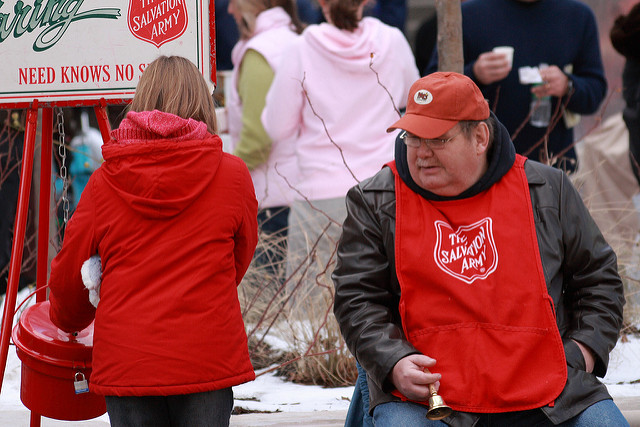The LGBT Community Still Wants an Apology From the Salvation Army

By:
For years, questions have circled the Salvation Army's alleged history of discrimination against LGBT people, especially as their bell-ringers once again populate storefronts for the holiday season.
 Flickr - flic.kr
Flickr - flic.kr
Despite recent efforts to update its public image, the Salvation Army, which finances services in 127 countries through donations and government funding, won’t address claims that it has refused services to LGBT individuals and lobbied against nondiscrimination laws. Unfortunately for the Salvation Army, such discrimination has been well-documented.
For example, when the George W. Bush administration established its "faith-based initiative" in 2001, which promised federal funding to religious charities that provide social services, the Salvation Army requested that it be exempt from laws banning discrimination based on sexual orientation. In 2004, when New York City considered legislation that would require businesses to extend health benefits to partners of gay employees, the evangelical organization threatened to shut down its soup kitchens and shelters. As recently as 2012, a Vermont caseworker claimed she was fired after she came out as bisexual to her supervisor.
However, according to a 2015 piece by The Advocate, Salvation Army spokespeople argue this part of the group’s past is based on rumor and misinformation.
 Flickr/Mike Mozart - flic.kr
Flickr/Mike Mozart - flic.kr
Since advocates organized a boycott of the Salvation Army’s iconic Red Kettle Campaign in 2011 to draw attention to the organization's history of LGBT discrimination, the church’s public relations team has implemented various social media and marketing strategies to “debunk” what they categorize as hearsay. As reported by The Columbus Dispatch, the Central Ohio chapter features a video on its website called “The Salvation Army is Open to All.” In the video, employees explain that access to shelters and other services isn’t determined by gender identity or sexual orientation, implying anyone who thinks otherwise is simply misinformed. In the video, one spokeswoman even says she’s confused about the source of this “myth.”
While the Salvation Army’s main website currently says very little about their stance on homosexuality, simply reiterating that it serves clients and hires employees regardless of sexual orientation, this wasn’t always the case. A longstanding statement describing scripture’s opposition to “homosexual practices” wasn’t taken down until 2013. Though the Salvation Army didn't respond to a request for comment, the organization’s PR team has used Twitter in a continued attempt to assert that it doesn’t discriminate or use donations to fund anti-LGBTQ initiatives.
Some members of the LGBTQ community welcome the progress.
Grant Stancliff, a member of Equality Ohio, told The Columbus Dispatch that acknowledging positive change is important. Stancliff recalls relying on the church’s services as a child and concludes that its latest efforts express sincere “reflection and growth.”
But others want the Salvation Army to come clean. Bil Browning, who founded the LGBTQ blog The Bilerico Project in 2007, recently told ThinkProgress that he’d donate to the organization if it apologized to LGBTQ people. Since he and his boyfriend were allegedly turned away from a Salvation Army shelter, Browning has written extensively about the organization’s changing policies. He was one of the many writers calling for the 2011 boycott. After one of his articles went viral that year, The New York Times called him the “Red Kettle Menace.”
 Flickr/Sage Ross - flic.kr
Flickr/Sage Ross - flic.kr
Public apologies aren’t unprecedented, Browning explained, citing the Salvation Army of Austraila’s apology for an anti-gay statement made by media relations director Andrew Craibe. In 2013, the organization also apologized for links on its website that led to ministries seek to "cure" people of their homosexuality. However, instead of directly addressing their past, the Salvation Army has turned to describing its mistakes as myth and rumor. “Therein lies the problem,” Browning wrote in a 2014 blog post, “the Army has still avoided the one thing that can give it the redemption it seeks.”
